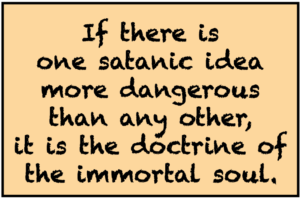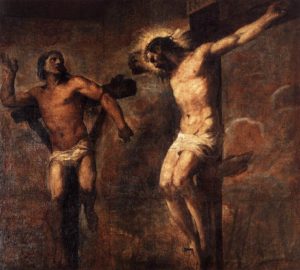Let’s take a look at the infamous story of the first Israelite king, Saul, and his encounter with the witch of En-dor. The story is one of the primary pillars propping up belief in body-soul dualism and the immortality of the soul. For those who have such a viewpoint, it offers concrete evidence that the dead are not truly dead but are, in fact, alive in spirit form.
You can read the whole story for yourself in 1 Samuel 28. Here it is in a nutshell:
The Philistine army, was ready to attack. Saul knew that his army had little chance of victory in the impending battle. He inquired of the Lord through priests and prophets, seeking counsel and encouragement. No answer came. Saul panicked.
Seeking some alternate way to avert disaster, he went to En-dor to see a witch. He asked her to put him in touch with Samuel, the recently deceased prophet of the Lord. She complied. Saul conversed with Samuel. He came away from the encounter as a hopeless, helpless, broken man. He committed suicide on the field of battle the following day.
Among theologians there are various interpretations of this strange story. Here is my clumsy attempt to summarize the two primary schools of thought:
[A] — The witch either had the power to bring Samuel up from the dead, or God sent Samuel back from among the dead to speak with Saul – making it look like the witch did it.
[B] — The witch called up an evil spirit disguised as the prophet, and Saul only thought he was talking with Samuel.
Full disclosure: I agree with [B]. The narrative itself offers clues to proper interpretation and raises questions that challenge [A].
1 Samuel 28:3 holds an essential part of the story: “Samuel was dead.” The beloved prophet had been the spiritual leader of the nation nearly all his life. It was he who had anointed Saul as king. He had been Saul’s counselor and confessor. He had loved Saul and grieved when the king departed from the will of God. He died, “and all Israel had lamented him” (v 3).
The verse continues: “And Saul had put away those that had familiar spirits, and the wizards, out of the land.” The fact that this policy was necessary reveals the persistence of spiritism, necromancy, witchcraft, etc., within the territory of ancient Israel – in spite of God’s commands.
Centuries earlier, Moses himself had warned the Israelites against occult practices. “For all that do these things are an abomination unto the Lord” (Deuteronomy 18:12). He said the Lord would drive the Canaanites out of their land specifically because they had practiced these abominations.
Repeated warnings came from God through Moses:
“Thou shalt not suffer a witch to live” (Exodus 22:18).
“Regard not them that have familiar spirits, neither seek after wizards, to be defiled by them: I am the Lord your God” (Leviticus 19:31).
“The soul that turneth after such as have familiar spirits, and after wizards . . . I will even set my face against that soul, and will cut him off from among his people” (Leviticus 20:6).
Let me interrupt myself by asking a few questions:
Why did God want to ban mediums, witches, necromancers, and the like?
Was it because He wanted to deny to the bereaved the comfort of contact with their deceased loved ones?
Was it because he didn’t want human beings to obtain knowledge from “the great beyond?”
Was God arbitrarily withholding some good thing from His chosen people?
Isn’t it possible that this prohibition was protective; that occultism would put people in contact with “the dark side” – demons or devils or evil spirits?
Okay, enough questions.
1 Samuel 28:4 says that the long-running conflict between Saul and the Philistines had come to a head. The armies were in position for a decisive battle, and Saul didn’t like the way things looked. “And when Saul saw the host of the Philistines, he was afraid, and his heart greatly trembled” (v 4).
Without Samuel to counsel him, what could he do but pray? “And when Saul inquired of the Lord, the Lord answered him not” (v 6). No prophet came forward in response to his prayers. No vision appeared. No supernatural sign of any kind. God, it seemed, had deserted him.
This should have come as no surprise to Saul. His presumption, disobedience, and rebellious spirit had cost him God’s favor. It was his beloved friend and mentor, the prophet Samuel, who had told him, “Thou hast rejected the word of the Lord, and the Lord hath rejected thee from being king over Israel” (1 Samuel 15:26).
Now, on the eve of battle, where could he turn? Only one way. Away from God.
“Then said Saul unto his servants, Seek me a woman that hath a familiar spirit, that I may go to her, and inquire of her. And his servants said to him, Behold, there is a woman that hath a familiar spirit at En-dor” (1 Samuel 28:7).
En-dor and nearby cities and villages were in the region assigned to the tribe of Manasseh. It was a Canaanite stronghold, and the tribe of Manasseh was supposed to drive out the inhabitants and occupy the territory. According to Joshua 17:12, “the people of Manasseh could not take possession of those cities, but the Canaanites persisted in dwelling in that land.” It’s possible that the woman King Saul went to see was a leftover Canaanite who communicated with the Canaanite “gods” of the underworld.
Whoever she was, she wasn’t supposed to be there. It seems that the king had no misgivings as to how thoroughly his ban on practitioners of the occult had been carried out. He knew there must be a witch or two left in the land.
With two of his men Saul disguised himself and went to see the woman that night. “He said, I pray thee, divine unto me by the familiar spirit, and bring me him up, whom I shall name unto thee” (v 8). She was alarmed. She knew about King Saul’s orders. Perhaps this was an attempt at entrapment. “Wherefore then layest thou a snare for my life, to cause me to die?” (v 9).
Saul swore an oath in God’s name, promising that “there shall be no punishment happen to thee for this thing” (v 10). “Bring me up Samuel” (v 11).
The narrator doesn’t give us the details of her incantations as she conjured up the apparition. He skips right to the moment when the woman put two and two together and knew she had been duped. “And when the woman saw Samuel, she cried with a loud voice: and the woman spake to Saul, saying, Why hast thou deceived me? For thou art Saul” (v 12).
He allayed her fears, saying, “Be not afraid: for what sawest thou?” (v 13). His question is important to those of us who want to know what was really going on there. Saul was there, but he saw only the woman. He did not see the apparition.
She replied, “I saw gods ascending out of the earth” (v 13). Notice that she used a plural noun, “gods.” The Hebrew word used here is often translated in the singular sense as “god” or “God,” but the King James translators decided on the plural form.
So, what did she actually “see?” As a medium or necromancer, she thought that the underworld was inhabited by the spirits of the dead along with the demons and deities who ruled the place. She may have “seen” multiple spirits “ascending out of the earth.”
Saul, however, was only interested in one spirit. “What form is he of? And she said, An old man cometh up; and he is covered with a mantle. And Saul perceived that it was Samuel” (v 14).
Here is where the story serves up a big question mark to those who believe that righteous people go to heaven or paradise when they die. Certainly, Samuel was a righteous man. According to common belief he should have been somewhere “up there.” What was he doing in the underworld?
For some of us, Samuel “coming up” is a clue that the woman was seeing an apparition disguised as the dead prophet – “an old man. . .covered with a mantle.” King Saul had nothing to go on but her description, and based on what she said, he “perceived” that it was Samuel. “He stooped with his face to the ground, and bowed himself” (v 14).
The narrator then takes Saul’s perspective as it recounts the ongoing dialogue. It relates the experience as through the eyes and ears of Saul, who believed that he was conversing with Samuel. But the conversation was not necessarily an objective reality. Saul could have been speaking with an imposter.
What we read is Saul’s truth. Theologian Grenville Kent calls this a case of “focalized narration.”[1] Let’s look at one of his examples:
In an earlier Israel vs. Philistine episode, the Israelites decided to weaponize the ark of the covenant. They carried it onto the field of battle, supposing that its presence would assure their victory. “And when the ark of the covenant of the Lord came into the camp, all Israel shouted with a great shout…” (v 5).
Up to this point the story has been told from the perspective of the Israelites. Then the narrator shifts to the Philistine point of view. They heard the “great shout” from the Israelite side, and “they understood that the ark of the Lord was come into the camp” (v 6).
The Philistines mistakenly assumed that the ark was a deity – similar to their own gods of wood and stone, only much more powerful. That was their truth. They had “heard” and “understood” – and had come to a false conclusion.
The misperception led to panic. “Woe unto us! for there hath not been such a thing heretofore. Woe unto us! who shall deliver us out of the hand of these mighty Gods?” (v 8).
Grenville Kent makes an important point. The writer of 1 Samuel sometimes lets us see things through the eyes of his characters. From the Philistine point of view, we see the ark of the covenant as a god. In reality, it wasn’t. From King Saul’s point of view, we hear the voice of a dead prophet.
People used to tell me that I sounded just like my father on the phone. If I answered a call at his house the person at the other end of the line would assume that they were talking with him. If I didn’t interrupt and get Dad on the line, the conversation could be completed, and goodbyes said, without the caller suspecting the truth. The caller would remember having had the conversation with my father, not with me.
Could something like that have been happening when the doomed King Saul engaged a spirit medium on the last night of his life? According to the account in 1 Samuel 28, the witch of En-dor mediated the contact between Saul and an apparition she described as “an old man…covered with a mantle.”
It seemed to Saul that her incantations had succeeded in enticing the recently deceased prophet, Samuel, out of the realm of death. Saul “perceived” that it was Samuel, though he never saw him.
During his years as a counselor to the king, Samuel had delivered scathing rebukes. The prophet had declared Saul unfit to rule over Israel and announced, in no uncertain terms, that his reign would end and the kingdom would be given to another. (See 1 Samuel 13:13-14 and 15:13-28.)
Up to this point in the story the apparition had revealed nothing Saul did not already know. But then, this: “Moreover the Lord will also deliver Israel with thee into the hand of the Philistines: and tomorrow shalt thou and thy sons be with me: the Lord also shall deliver the host of Israel into the hand of the Philistines” (1 Samuel 28:19).
This was new. What was going on? Was this an add-on punishment for Saul? Was it something the living prophet had forgotten to tell him? Was the apparition an inspired messenger of God, bearing a genuine prophecy? Let’s break it down and see what we come up with.
First, “the Lord will also deliver Israel with thee into the hand of the Philistines: …the Lord also shall deliver the host of Israel into the hand of the Philistines.” Did that happen? The Philistines defeated the Israelites in battle the following day, but Saul himself proved the prophecy false by taking his own life rather than falling into the hands of the Philistines.
Second, “tomorrow shalt thou and thy sons be with me.” This suggests that the wicked, rebellious king would end up in the same situation as the godly prophet. Could that be true? That’s pretty hard to swallow if you believe that the righteous and the wicked have different after-death destinations.
But what about the prediction about Saul and his sons dying? Did it happen? Well, Saul died, along with three of his sons: Jonathan, Abinadab, and Melchishua. But Saul’s fourth son, Ishbosheth, survived and assumed his father’s throne. (See 2 Samuel 2:8-12). Clearly, this part of the prophecy failed as well.
We can safely judge the apparition as a false prophet, and certainly not the prophet Samuel. But King Saul himself bought every word and went out into a hopeless night, convinced that his doom was sealed. It was.
This story has aroused the critical curiosity of theologians for the last 2,000 years. Was Samuel (or the ghost/spirit of Samuel) actually in touch with King Saul, or was the whole thing a demonic deception? Among theologians, opinions vary. Many who believe that souls/spirits survive death are inclined to accept the story at more or less face value.
Many current teachers and preachers assume the worst – that Samuel, or his spirit, really appeared and communicated with Saul. This belief, combined with the doctrine of the immortal soul, is risky. It leaves people vulnerable to evil spirits who can impersonate the dead. Those most in danger are the grieving, who crave some contact with loved ones who have died.
For our own good we all need a thorough understanding of God’s Word. Its truths may be unpopular. Its teachings may require some digging. But it is the best defense against deception and false doctrine.
[1] Grenville J. R. Kent, “‘Call Up Samuel’: Who appeared to the Witch at En-dor? (1 Samuel 28:3-25),” in Andrews University Seminary Studies, Vol. 52, No. 2, 141-160.


 Did Jesus tell a dying thief that the two of them would be together in Paradise that very day?
Did Jesus tell a dying thief that the two of them would be together in Paradise that very day?